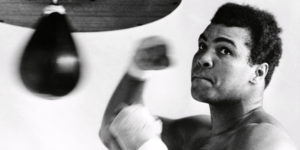As I’ve spent the day pondering last night’s sad news about Muhammad Ali’s death, I was struck by a realization of the era in which he was such a dominant force.
It was that he flourished in a simpler and more complex time.
Ali died of Parkinson’s disease at the age of 74. He apparently had become quite frail in the final months of his life. But what a departure from the picture of strength he exhibited back in the day.
The simplicity of his era is marked by this fact: As the heavyweight boxing champion of the world, Muhammad Ali was the baddest man on the planet.
The night he stopped Sonny Liston after the sixth round to win the title the first of three times, he yelled, “I shook up the world! I’m a ba-a-a-a-d man!” Yes he was.
In those days, without the multitude of boxing commissions and sanctioning bodies we have today, you had an undisputed champ. Ali was that man.
Today, well, it’s far different. You’ve got at least three heavyweight champions of the world. There are times when you have something called “interim champion”; I don’t even know what the hell that means.
All these “world champs” are recognized only by certain governing bodies. If you’ve got the patience, you can slog through all of them.
I quit following the sport — certainly the heavyweight division of it — about the time Larry Holmes walked away from the championship.
The complexity of Ali’s prime time is reflected in the political climate of the era.
Ali got his draft notice from the Selective Service Administration. He had converted to Islam. He vowed never to take up arms against people. Ali refused to be inducted into the armed forces to protest the Vietnam War.
And by 1967, the political mood of the nation had turned against the war. We weren’t winning it the way to which we had grown accustomed. Ali’s refusal to serve rubbed many millions of Americans raw. How dare this brash, young fighter refuse to serve his country, many people said. Why, he had amassed tremendous wealth because of all that the country had offered him.
That didn’t matter to Ali. He stood on principle.
The boxing authorities — the few of them that existed at the time — stripped him of his title. They denied him permits to fight. He was denied an opportunity to do the one thing he did better than anyone on Earth: beat people up.
The Vietnam War raged on while Ali was denied permission to fight.
The champ did not recede quietly into the shadows. He spoke out against the war. He spoke against what he perceived to be the systemic racism that was denying him his right of free expression.
Muhammad Ali became “the most recognizable person on Earth.”
Who today can make that claim?
The U.S. Supreme Court finally would undo the injustice brought to Ali. It voted unanimously to throw out Ali’s conviction for draft evasion. He returned to the ring.
The rest became history … and what a story Muhammad Ali was able to tell.
